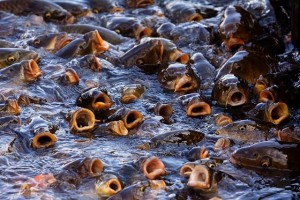From Ecclesiastes:
Send out your bread upon the waters, for after many days you will get it back.
(From the Daily Office Lectionary – Ecclesiastes 11:1 (NRSV) – June 12, 2014)
 I have to admit that on first reading this, I had no idea what Qoheleth is saying here! Not the slightest.
I have to admit that on first reading this, I had no idea what Qoheleth is saying here! Not the slightest.
So I looked at a few commentaries and they all seem to agree (a) that “casting bread on the waters” was an ancient Israelite metaphor for wastefulness, something to be avoided and (b) that the preacher is using turning this metaphor on its head and encouraging generosity to the poor and unfortunate.
OK, so far — I’m enough of an aging hippie that “bread” as slang (“metaphoric language”) for wealth makes sense. “Waters” as a reference to the poor is new to me, but I suppose it works (although I’m rather more familiar with Edward Bulwer-Lyton’s opposite connotation phrase “the great unwashed”).
The “after many days you will get it back” is where I get caught up. This must be a spiritual return, not a monetary return, because there’s no way that that bread is every coming back. Not in this world!
Thinking about throwing bread onto water, I remember the Lake Mead Marina in Nevada. Throw a piece of bread in the water there and the surface becomes a roiling, boiling, thrashing mass of carp! And the bread . . . gone instantly, torn apart by gluttonous fish.
As a vision of what happens to one’s gifts of charity, it’s not very edifying. And pretty much kills any notion that “after many days you will get it back.”
But then . . . Jesus, contrary to Qoheleth, made it pretty clear that that’s not a valid consideration! It’s not a consideration at all. “Return on investment” is irrelevant. Yesterday was the feast of St. Barnabas the Apostle and, at the Eucharist, the Gospel lesson was from Matthew, the sending out of the Twelve in which Jesus instructs them, “You received without payment; give without payment.” (Mt 10:8b) Similarly, in the Sermon on Plain, he told the crowds, “Love your enemies, do good, and lend, expecting nothing in return.” (Lk 6:35) Now, Jesus did promise that those who were thus generous would be rewarded: “Give, and it will be given to you. A good measure, pressed down, shaken together, running over, will be put into your lap; for the measure you give will be the measure you get back.” (Lk 6:38)
There will be a return. We’re just supposed to not expect it, which Qoheleth seems to encourage.
That’s the hard part for me. The “not expecting” part. How can I not expect what I am told will happen? How can I not anticipate that and take it into consideration?
And that’s where Qoheleth’s “bread on the waters” metaphor is helpful. I just think about those hungry carp . . . and, nope, no expectation of return. Not one!
====================
A request to my readers: I’m trying to build the readership of this blog and I’d very much appreciate your help in doing so. If you find something here that is of value, please share it with others. If you are on Facebook, “like” the posts on your page so others can see them. If you are following me on Twitter, please “retweet” the notices of these meditations. If you have a blog of your own, please include mine in your links (a favor I will gladly reciprocate). Many thanks!
====================
Father Funston is the rector of St. Paul’s Episcopal Church, Medina, Ohio.



Leave a Reply